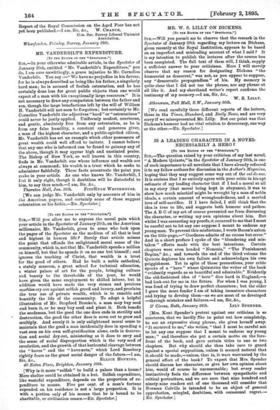[To THE EDITOR OF THE " SPECTATOR."]
SIR,—Will you allow me to express the moral pain which your article in the Spectator of Jalriary 26th, on the American millionaire, Mr. Vanderbilt, gives to some who look upon the pages of the Spectator as the medium of all that is best and highest in human life ? Surely that article misses the point that offends the enlightened moral sense of the community, which is, not that Mr. Vanderbilt spends a million on himself, but that he spends it on no one but himself ; and ignores the teaching of Christ, that wealth is a trust for the good of others. Had he built a noble cathedral, a stately museum, a great school for technical education, a winter palace of art for the people, bringing culture and beauty to the thresholds of the poor, he would have given the same employment to skilled labour, but in addition would have made the very stones and precious marbles cry out against selfish greed and luxury, and proclaim the true use of private wealth, which is to ennoble and beautify the life of the community. To adopt a helpful illustration of Mr. Stopford Brooke's, a man may buy seed and burn it, or he may buy seed and plant it. Both benefit the seedsman, but the good the one does ends in sterility and destruction, the good the other does is sown out to grow and multiply. And surely it is only enlightened moral sense to maintain that the good a man incidentally does in spending a vast sum on his own self-gratification alone, ends in destruc- tion and social dry-rot, ministering as it does to envy and the sense of social disproportion which is the very seed of revolution, and the growth of that horizontal cleavage between the " haves " and the "have-note," which Lord Rosebery rightly fears as the great social danger of the fature.—I am,
Sir, &c., ELLICE HOPKINS. 40 Eaton Place, Brighton, January 29th.
[Why is it more " selfish " to build a palace than a house? Mere shelter could be obtained in a hut. Selfish expenditure, like wasteful expenditure, depends on the proportion of ex- penditure to means. Five per cent. of a man's fortune expended on his residence is not a" large proportion. It is with a portion only of his means that he is bound to be Charitable, or civilisation ceasee.—ED. Spectator.]


































 Previous page
Previous page